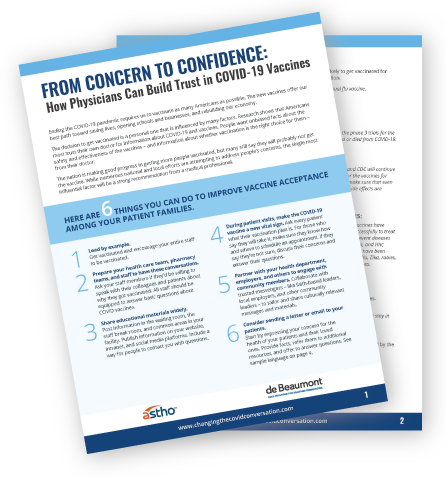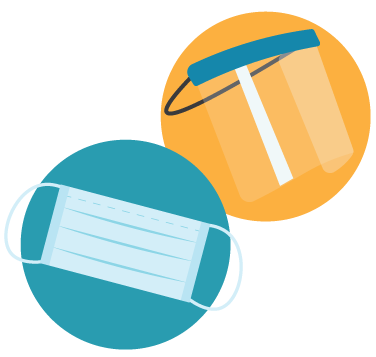COVID-19 Information for Healthcare Providers
Important Updates & Resources
Building Confidence in COVID-19 Vaccines
Getting vaccinated is a personal decision influenced by many factors, but research shows that Americans most trust their own doctors about COVID-19 vaccines. Our best path toward saving lives, opening schools and businesses, and rebuilding our economy is centered on strong vaccine recommendations from medical professionals.
What is vaccine confidence?
Vaccine confidence is the trust that patients, their families and providers have in the recommended vaccines, the providers that administer them and the processes used to develop them.
Why is it important?
Strong vaccine confidence leads to more vaccinations, which means fewer COVID-19 illnesses, hospitalizations and deaths. The medical system has a long history of mistreating Black and disabled Americans. This earned mistrust means it’s essential to foster confidence as we try to vaccinate as many Louisianans as possible.
6 ways to build vaccine confidence
- Lead by example. Get vaccinated, and urge your entire staff to do the same.
- Share your experience. Talk to patients, friends and family about why you chose to get vaccinated.
- Focus on education. Share educational materials throughout your facility, on your website and on social media. Make it easy for people to ask questions.
- Provide guidance. Ask every patient if they plan to get vaccinated. If they do, explain how they can schedule an appointment. If they’re unsure, ask about their concerns and answer their questions.
- Collaborate for greater impact. Partner with your health department and trusted community leaders to share culturally relevant messages and materials about the vaccine.
- Reach out to patients. Send a letter or email to your patients expressing concern for them and their loved ones. Provide vaccine facts and resources, and offer to answer any questions.
Additional Vaccine Confidence Resources


Safe COVID-19 Vaccine Administration
General Safety Tips
- Wear a medical face mask at all times.
- Wash hands and clean the room between all patient appointments.
- Use eye protection if needed (based on level of community transmission).
- Wear gloves when administering vaccines. Change gloves between each patient and maintain proper hand hygiene.
Facility-level guidelines to minimize patient exposure
- Screen patients for COVID-19 symptoms and any contact with COVID-19.
- Isolate symptomatic patients immediately.
- Limit and monitor facility entrances. Install barriers to limit contact with patients at triage.
- Require anyone over 2 years of age to wear a cloth face covering.
- Encourage everyone to practice good respiratory hygiene, cough etiquette and hand hygiene.
- Separate sick patients from well patients by scheduling these visits during different times of the day.
- Ask patients to remain outside until they are called into the facility, if possible.
- Keep patients and visitors at least 6 feet apart using physical barriers, signs, ropes or floor markings.
- Use electronic communications to minimize patients’ in-office time and the reuse of supplies such as pens and clipboards.

Common Provider Vaccine Questions & Answers
-
Can the COVID-19 vaccine be administered at the same time as other routine vaccines?
COVID-19 vaccines and other vaccines may now be administered without regard to timing. The previously recommended 14-day interval was created out of an abundance of caution and not due to any known safety or immunogenicity concerns. COVID-19 vaccines can now be simultaneously administered with other vaccines on the same day.
-
If a patient does not come back on time for the second dose of an mRNA COVID-19 vaccine, do we need to restart the vaccine series?
No. Administer the second dose to complete the series. Although the second dose should be administered as close to the recommended interval as possible, it may be administered up to 42 days after the first dose when a delay is unavoidable. Even if the second dose is administered beyond the allowable interval, the series does not need to be restarted. Providers should not hold or save doses for patients who have not returned more than 42 days after their first dose. Providers should regularly assess missed second doses and repurpose them as first doses for eligible persons.
-
If the second dose of mRNA COVID-19 vaccine may be given before the recommended interval because of the four-day grace period, should we offer the option routinely?
No. People should not be scheduled to receive dose two earlier than recommended (21 days for Pfizer-BioNTech and 28 days for Moderna). Schedulers should offer second dose appointments beginning on the date of the recommended interval. CDC guidance allows for the second dose to be given up to four days before the recommended interval in order to avoid missed vaccination opportunities when a recipient unexpectedly arrives early and might not return on schedule.
-
What do I do if my COVID-19 vaccine is set to expire soon?
If your vaccine is set to expire within 48 hours, follow these instructions:
- Identify any eligible persons and offer to administer the vaccine.
- Contact your facility’s vaccine coordinator to determine if any unopened packages that are set to expire can be used at another location within 24 hours.
If your vaccine is set to expire within six hours, follow these instructions:
- Identify any eligible persons and offer to administer the vaccine.
- Administer a second dose to any eligible person.
- Administer the vaccine to any other persons who want it.
If you cannot find anyone to administer the vaccine to, or you need additional assistance, contact your regional immunization program supervisor.
-
How can I avoid vaccine wastage?
- Monitor the expiration date
- Only take out what you need
- Follow recommended storage and handling guidelines
- Monitor vaccine storage unit temperatures
- Have a vaccine waitlist
- Have a backup power supply
- Educate all staff handling the vaccine
-
Where can I get proof I was vaccinated for COVID-19 if I lost my vaccine card?
Anyone who was vaccinated can register online with the MyIR Mobile application to access his or her immunization record. To access MyIR Mobile, visit https://myirmobile.com/. You can also use a smartphone app called V-safe. This tool uses text messaging and web surveys to provide personalized health check-ins after you receive a COVID-19 vaccination. You can use V-safe to inform the CDC if you experience any side effects from the vaccine. The app will also remind you to get your second COVID- 19 vaccine dose if needed. You can find out more about the V-safe app here.
Provider Enrollment Hotline
Enroll as a COVID-19 vaccine provider. LDH created a COVID-19 Provider Enrollment Hotline to help with this. Call 225-354-3570 with any questions.
Hours: Monday - Friday, 8 a.m. - 4:30 p.m.
Services:
- Assistance with the Provider Enrollment Process and Provider Agreements
- Locating an Immunization Consultant Within Your Region Provider Status Updates
- For technical assistance with LA LINKS, email LA.LINKS@la.gov

